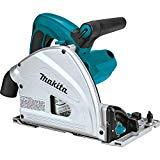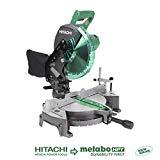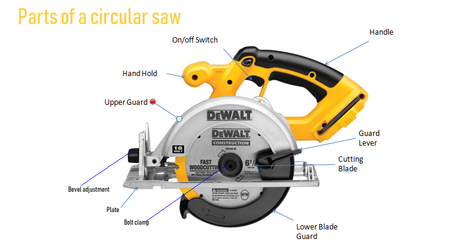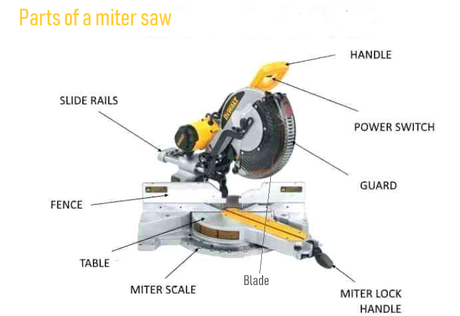
If you are getting into woodworking, you will automatically come across two power saws i.e. miter saw or circular saw. At first, the two will confuse you and it will become hard for you to know what to buy especially when you are in shopping and you have not done prior research to understand what each saw does.
In case you are new to the world of woodwork, we have actually done all the research for you because this article is all about a miter saw vs circular saw.
Image


Weight 9.7 pounds 24.2 pounds
No Load motor speed 2,000-5,200 RPM 5000RPM
Price Check Price on Amazon Check Price on Amazon
Circular saw
This is one of the oldest woodworking tools. They first came into use in the 18th century but not as circular saws but as rip saw and they were used in sawmills to convert huge logs into lumber. Before circular saw invention, logs were cut using powered saws that moved up and down with a reciprocating motion. Circular saws made the work easier by cutting logs faster because their teeth’s are in rotary motion. Therefore, what is a circular saw?
A circular saw is a corded or cordless power saw that has a round blade to make cuts on wood, plastic, and metal depending on the type of blade the saw is using.
Below are key parts of a circular saw

To understand everything about circular saw you need to know different parts and their use. They comprise of the following main parts.
Blade
Circular saw blade is what is used for all the cutting. There are different blade sizes depending on the saw body. Commonly used blade in most circular saws is 7 inches in diameter. This type of blade is capable of cutting through any tough material.
You can remove and change the saw blade if you open the bolt clamp. It is also important to note that there are different types of blades for cutting specific material. For example, a blade used for ripping wood material cannot be used to cut metals.
Bolt clamp
The blade is firmly attached to the circular saw body using bolt clamp. Blades can be changed only by first opening the clamp.
Lower and upper blade guard
To protect the person operating the saw, upper and lower blade guard is snugly fitted around the blade. The guards help in preventing accidental contacts with the rotating blade.
Bevel adjustment
This is a very crucial part of a circular saw. It is useful in making adjustments that enable the user to make different bevel angle cuts on the workpiece.
Plate
The plate is also known as the shoe. To avoid lifting the saw while working, plate sits the circular saw on the work material, therefore, enabling you to maintain a steady level without getting tired.
Handle with on and off switch
The handle is a very useful part of a saw. Its main function is moving the saw while working. Most circular saw models have handles that are ergonomically designed so that you can work without getting tired easily.
Located underneath the handle is an on and off switch which is conveniently in place for easy powering on and off the saw.
To operate a circular saw, you need either a circular saw stand or a circular saw table. You can use either one to place the workpiece and you saw while working.
Pros
- They are capable of cutting different material using special blades e.g. metal, wood, tiles and plastic
- You can easily carry a circular saw from one place or Jobsite to another easily they are light.
- Circular saw is capable of ripping a sheet of a longboard in seconds because they have terrific speeds.
Cons
- This is one two that you cannot predict what will happen next. It can be carried and operated anywhere. One thing most people do not know about circular saws is that they are prone to kickback and if you are not careful this tool can slice your fingers or even whole hand.
- Circular saws are not the best for angle cuts. If you try to make angle cuts with this tool, you will realize they are sloppy. For a woodworker who has a lot of trim work to perform you will waste a lot of time if you use a circular saw.
Miter saw
Also known as, drop saws, miter saws are powerful tools that are useful when making fast and accurate crosscuts on a piece of material at different angles.
ED Niehaus who was Rockwell designer in 1964 made the first invention of a miter saw. What followed later were more innovations and improvements on the saw because Rockwell did not patent their invention.
There are several types of miter saws and each with specific use i.e. making various miter cuts of different angles. You can read more about different types of miter saws.
Below are key parts of a miter saw

Just like a circular saw, miter saw also have different parts that can together to ensure they perform fast while ensuring the operator is also safe.
Blade guard
Miter saw blade guard has two main uses i.e. protecting the saw user when working and blade in case it falls when not in use and when working. The blade guard is fitted perfectly so that it can cover both top and bottom parts of the saw blade.
Blade
Miter saw blades determine the cutting capability i.e. the size of workpiece a miter saw can cut is directly proportional to blade size. Even though most miter saw blades are between 5 and 7 inches, contractor or hobbyist use bigger blades up to 12 inches.
Handle and power switch
Miter saw handle gives you total control while working. They are ergonomically designed to ensure you work for long without tiring up. Integrated inside the handle is the power switch, which lets you turn the miter saw on and off using just one hand that is holding the handle.
Fence
Miter saw fence is the flat surface that is sturdy where you can place a workpiece so that it can be stable in order to cut it. Fences with extra features are moveable from one position to another.
Table
A miter saw table is a large flat area that serves as the saw base and working space.The table has a cut-out slot where the blade is capable of going through as you bring it onto the workpiece.
Scale
Miter saw scale is useful when making angle cuts. Using scale you can set the miter saw to any degree and make a cut. Modern scales have a stop and lock for angles that are popular for example 45 and 90 degrees. Compound miter saws have an additional scale that is in the arm. They indicate the angle at which the saw is positioned.
Pros
- Miter saw is a tool that is all about precision. It is quick and easy to set up. You can be able to make various different types of angle and bevel cuts.
- They can be useful when installing different types of trims in the house. If you are a home DIY person a miter saw can be useful when making picture frames.
- In terms of safety, miter saws are safer. There is a blade guard to protect the saw operator. The blade motion is up and down around the arm that it is mounted on.
Cons
- Miter saws are not versatile because they cannot do anything else apart from making angle cuts. Most tools in a garage are capable of doing more than one task, for example, a circular saw. This is not the same when it comes to miter saws.
- These are not tools that can be available anywhere. They are expensive tools and very few woodworkers can afford them.
- Miter saws are stationary tools that are not mobile therefore when working you normally bring the workpiece near the blade to cut.
What are their differences?
Comparing circular saw vs miter saw, several differences stand out. For example
- Miter saws are heavy and stationary while circular saws are portable and easy to carry anywhere.
- Miter saws are specialized tools for making crosscuts whereas circular saws are versatile tools capable of cutting metals, plastics, and wood.
- Circular saws are unsafe and you can easily cut your finger while operating them. Miter saw are safer because they have blade guard.
Conclusion
It is upon you to decide what you need between miter saw vs circular saw. These are two different tools with one being more specific and the other more versatile. For example, let say you have a toothache, would you prefer seeing a dentist or a general doctor who can treat different diseases in the body. A miter saw is a dentist in this comparison and a circular saw is a general doctor. Depending on what you are working on, make sure you make the right decision.
Below are some of the related questions to this topic.
Do I need a circular saw if I have a miter saw?
Similar question to this people ask is “should i buy a circular saw or a miter saw first”
The answer is Yes and NO. It all depends on all you want to do. If you are only working with wood and you are not intending to rip large boards, you definitely do not need a circular saw. However, if you want a versatile saw that is capable of cutting different materials, then you will definitely need a circular saw.
It is important to note that a miter saw is useful only when making angle and bevel cuts, you cannot change the saw blade to cut plastic or metals. Miter saws cannot also rip large and longboards.
Making miter cuts with a circular saw
It is not easy making miter cuts with a circular saw especially if you have a lot of work to do. It will take you a lot of time making a simple angle cut while using a circular saw because it does not have a miter gauge and scale. Miter gauge system in miter saw is what makes it easy to cut various angle cuts accurately. The scale can be adjusted easily for repeated cuts.
Find out What Do Use If You Don’t Have a Miter Saw
Sources:
https://en.wikipedia.org/wiki/Miter_saw
https://en.wikipedia.org/wiki/Circular_saw
